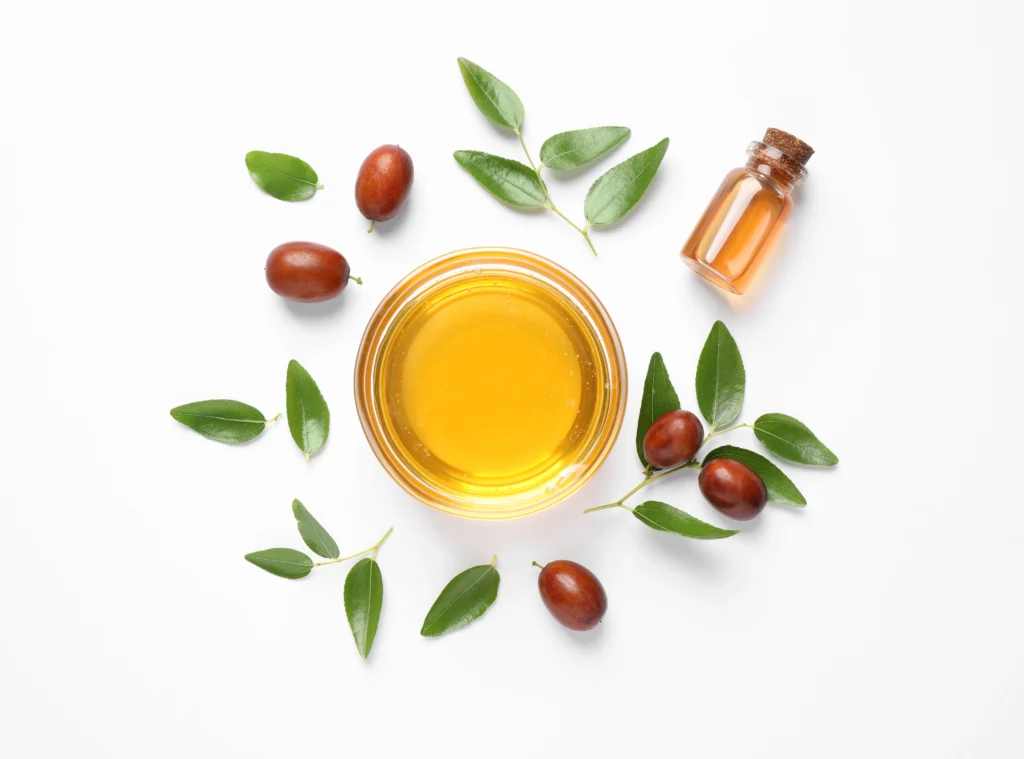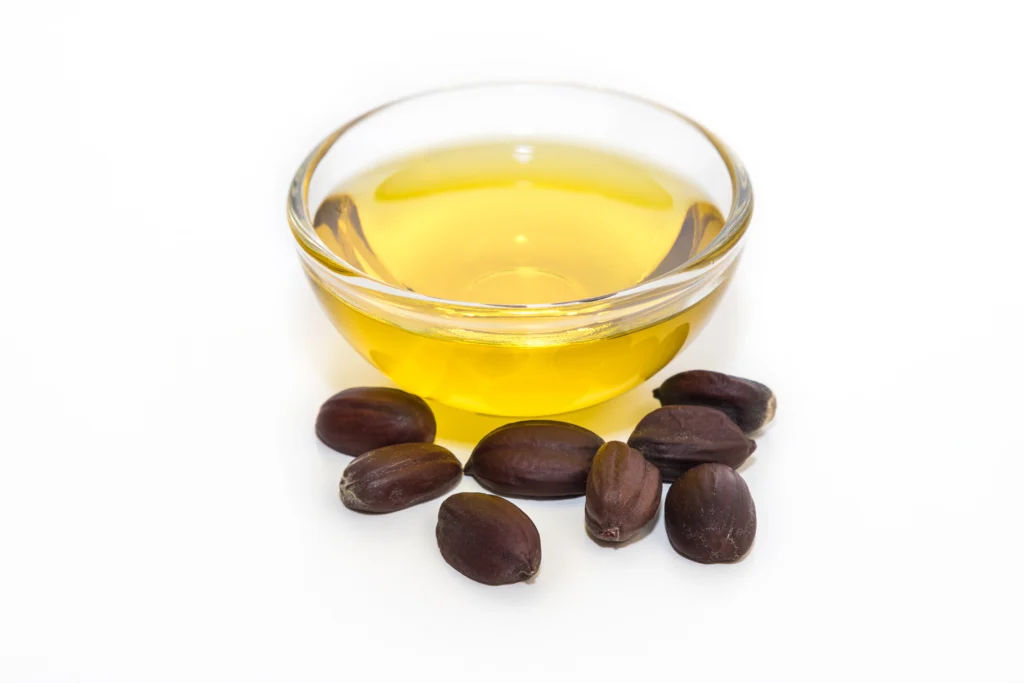
Jojoba oil is a natural substance popular for its hydrating and healing properties. It is derived from the Simmondsia chinensis plant, which is native to arid regions of North America. Its unique composition closely resembles that of human sebum, making it an effective agent in balancing skin oils and beneficial for all skin types.
As a multi-purpose beauty solution, jojoba oil can be used on your hair, skin, and nails to moisturise and protect.
Adding jojoba oil to your skincare routine can offer various advantages. Its ability to soothe and repair your skin helps alleviate symptoms of conditions such as acne, psoriasis, and sunburn. Its antibacterial and anti-inflammatory qualities may also contribute to a healthier and more radiant complexion.
Before we discuss composition and benefits in depth, it’s important to understand how jojoba oil is processed.
How Jojoba Oil is Extracted
The jojoba oil extraction process is meticulous, ensuring the oil’s valuable properties are retained for use in various products.
Jojoba seeds, which have a high oil content of about 50% by weight, are the starting point for this process. The methods used to extract jojoba oil include mechanical cold press, cold press followed by leaching and Leaching (chemical extraction), each with its own advantages.
- Mechanical press – In the cold press method, the oil is extracted from the seeds without applying heat. The high oil content of jojoba seeds, ranging from 45% to 60%, makes this method effective. Here, the seeds are first thoroughly cleaned to remove impurities or dirt. They are then crushed or ground into a fine powder. This powder is then pressed using a hydraulic press, which applies pressure to squeeze out the oil. The resultant oil is filtered to remove any remaining solid particles or impurities.
- Leaching (or chemical extraction) – Certain chemicals can also be used to extract jojoba oil. Solvents like hexane or petroleum ether are commonly employed in this method. The seeds are first crushed and ground into a powder, similar to the cold press method. This powder is then soaked in the solvent, allowing it to dissolve the oil. Afterwards, the solvent is evaporated, leaving behind the jojoba oil.
- Mechanical press followed by leaching: The mechanical press method alone doesn’t yield all the oil, as up to 10% remains in the pressed meal. To recover this remaining oil, an additional step involving hexane extraction of the pressed jojoba meal is necessary.
What is The Composition of Jojoba Oil
Jojoba oil resembles the natural oils our skin and hair produce. This similarity allows it to act as an effective and gentle moisturiser and conditioner.
In addition to its moisturising properties, jojoba oil is also rich in essential fatty acids and vitamins:
Jojoba Wax (Predominantly Wax Esters)
Jojoba oil is unique because it primarily comprises wax esters rather than triglycerides, which are found in most other plant oils. These wax esters are very similar to the sebum wax esters produced by our skin, making jojoba oil compatible with our skin’s natural biology.
Wax esters are responsible for the oil’s remarkable stability and long shelf life, as they do not oxidise or turn rancid as quickly as other oils. Jojoba oil is composed of almost 98% pure waxes, contributing to its deeply moisturising and soothing properties, making it an excellent ingredient for skin and hair care products.
Fatty Acids
While jojoba oil is mainly known for its wax esters, it also contains small amounts of free fatty acids. These fatty acids include oleic, linoleic, and arachidonic acids, among others.
Oleic acid is a monounsaturated fat that can help maintain skin softness and pliability.
Linoleic acid, an omega-6 fatty acid, is essential for healthy skin and hair growth. It helps maintain the skin’s barrier function and reduce inflammation.
Arachidonic acid, another omega-6 fatty acid, plays a role in repairing and regenerating skin tissues.
These fatty acids in jojoba oil enhance its ability to nourish and repair the skin.
Vitamin E
Jojoba oil is rich in vitamin E (approximately 79%), a powerful antioxidant that neutralises free radicals. These free radicals contribute to cellular damage and skin concerns like premature ageing. By providing these antioxidant benefits, it effectively supports skin health, promoting a youthful and radiant complexion.
Jojoba oil’s high vitamin E content makes it an excellent moisturiser, helping combat oxidative stress and promote overall skin health.

Health and Skincare Benefits
Jojoba oil has become a sought-after ingredient in skincare due to its unique properties and numerous benefits. This golden liquid wax has beneficial properties that nourish, protect, and rejuvenate your skin.
Good Moisturiser
You’ll find that jojoba oil is an effective moisturiser for your skin. Because it closely mimics the skin’s natural oils, it hydrates effectively without leaving a greasy residue. Jojoba oil also sends a signal to your hair and sweat follicles that your skin doesn’t require additional sebum, helping to balance oil production.
Capable Antioxidant
In addition to its moisturising properties, jojoba oil is packed with antioxidants. Vitamin E could effectively shield your skin against oxidative stress. These properties contribute to preventing signs of premature ageing, such as wrinkles and fine lines, by combating free radicals that damage skin cells.
Has Anti-inflammatory Properties
Jojoba oil can also be your ally in reducing inflammation. If your skin is prone to conditions such as eczema or rosacea, the anti-inflammatory agents can provide soothing relief. Its calming effects can also aid in healing minor irritations, reducing redness and providing overall skin comfort.
Jojoba Oil and Different Skin Types
Jojoba oil has become a popular natural remedy for a reason. Its unique makeup allows it to address a variety of skin concerns.
This section will explore how jojoba oil’s unique properties make it suitable for dry and sensitive skin and how it can regulate sebum production in oily skin types.
Suitable for Dry Skin
Jojoba oil helps the skin retain moisture, providing lasting hydration. It acts as an emollient, attracting moisture and forming a protective barrier to prevent water loss.
Lighter than other face oils, it absorbs easily without leaving a greasy residue.
Additionally, jojoba oil soothes irritation and inflammation often linked to dry skin thanks to its anti-inflammatory properties.
Gentle Enough for Sensitive Skin
Jojoba oil is gentle and safe for most skin types, which is what you want if you have sensitive skin. It is non-irritating and can be used without causing redness or aggravation, offering soothing qualities.
Its natural structure mimics the skin’s own sebum, so it blends seamlessly without irritating.
Balancing for Oily Skin
Due to its natural structure that closely mimics the skin’s own sebum, jojoba oil is adept at regulating oil production.
When applied to the skin, it can signal to the skin that it has produced sufficient oil, thereby reducing the overproduction of sebum. This regulatory effect is especially beneficial for oily skin, as it provides hydration without clogging pores (non-comedogenic), which can lessen the likelihood of acne formation.
Jojoba Oil and Various Skin Conditions

While jojoba oil shines in its ability to moisturise and balance various skin types, its benefits extend even further.
Its unique composition, which closely resembles the sebum naturally produced by our skin, allows it to support the skin’s health in several ways:
Eczema Relief
Eczema, or atopic dermatitis, is characterized by dry, itchy, and inflamed skin. Jojoba oil can be particularly beneficial for eczema sufferers due to its anti-inflammatory properties, which can help to soothe and reduce skin redness and irritation.
Its emollient nature helps hydrate the skin, providing a protective barrier that retains moisture and protects against allergens and irritants that can exacerbate eczema symptoms.
The wax esters in jojoba oil also aid in repairing the compromised skin barrier, a common issue with eczema. This promotes healing and prevents further moisture loss.
Jojoba oil has healing properties that may make it effective in treating skin conditions like eczema.
Acne
Acne is often the result of excess sebum production and clogged pores.
Unlike some oils that can clog pores and worsen acne, jojoba oil is non-comedogenic. This characteristic is ideal for acne-prone skin, as it won’t contribute to clogged pores and breakouts.
As mentioned earlier, its structure is very similar to human sebum’s, allowing it to help regulate oil production. It does this by signalling the skin that enough sebum has been produced, preventing the overproduction of sebum.
Similar to its benefits for eczema, jojoba oil’s anti-inflammatory properties can soothe existing acne and reduce redness associated with breakouts.